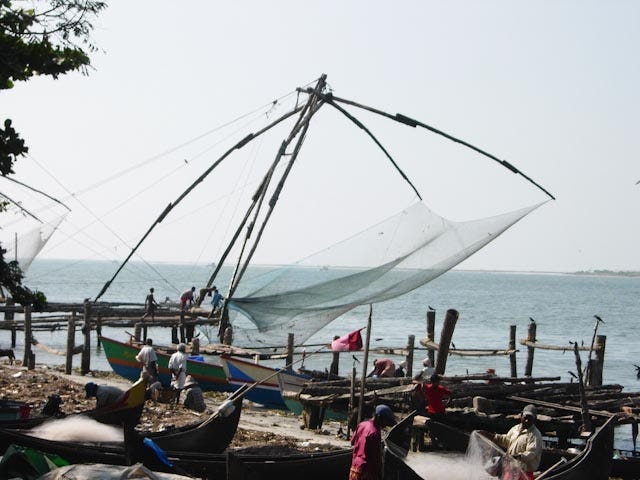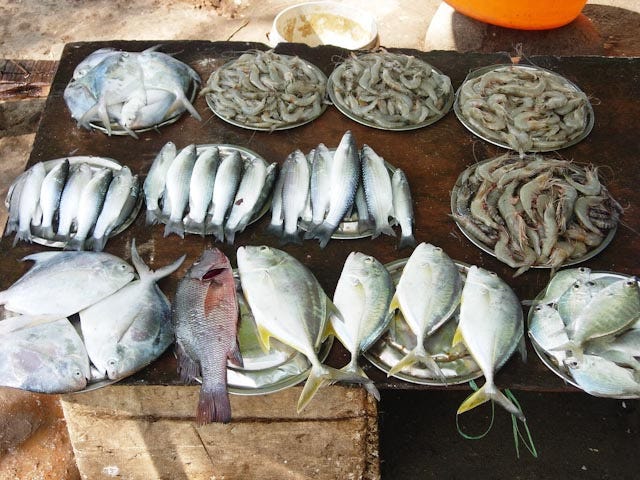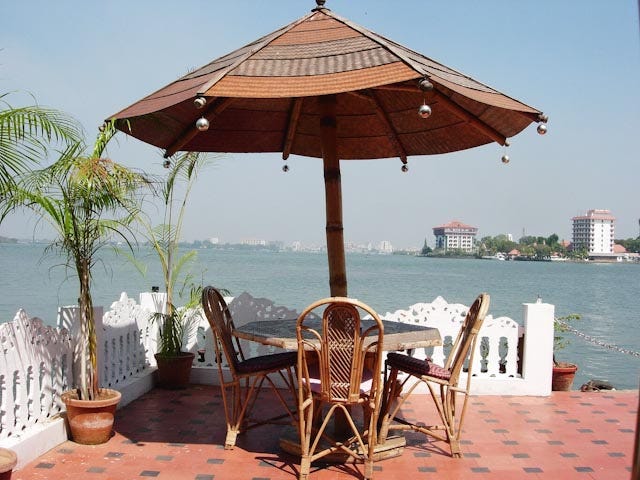Fort Kochi
Travels in India — 6
Walking over broken pavement down Park Avenue, only Subash Park separates me from the sea. It is a lush arrangement of tropical greenery in square gardens with brightly coloured swings and see-saws for children. It is very empty and will stay that way till about dusk when everyone comes out to play in the cool of the evening.
Before Subash Park turns into Childrens Park, the path veers left towards the ferry terminus. Bougainvillea froths and bubbles over the fence in shades of carmine, crimson, salmon red, orange, fuchsia, magenta and puce.
A one-way trip to Kochi (or Cochin, depending on whether you want to go by the old or new name) costs 250 paise, that’s 2.5 rupees, or less than 8c. I get a 50 paise piece in my change. It’s the first I’ve seen.
I duck my head as I enter the low flat ferry and take my place on a hard metal slatted seat. The engine stutters into life and we putter away from Ermakulum.
Lying between the mainland and Kochi like a chaperoning gooseberry is Willingdon Island. The Taj Malabar, looking like a squat air traffic control tower, dominates the end of this island and once we bypass its bulk, we can see Kochi coyly lying in wait for us.
As the ferry sidles up to the Customs terminal, Kochi refugees start to mobilise behind a large mesh gate. We are spewed down a long darkened passageway and finally emerge into a cool narrow laneway facing a shop with clean bright postcards displaying green-faced Kathakali dancers.
I head left down Bazaar Road towards Jewtown, one of the centres of Kochi’s spice trade. Kochi Jews are descended from those who fled Palestine over 2,000 years ago, although migration to Israel has reduced their number to just four families (14 people) by the end of 2002.
I pass emporia and warehouses (godowns) with dark mysterious interiors from where earthy odours of hessian and dirt, sweet hay, potatoes and onions waft. Merchants and Commissioning Agents on both sides, dealing in tea, dried chillies, perfumed oils, dried fruit and nuts. Men in mundus trudge in and out carrying sacks of produce while others sit and loiter as they chew paan.
Past these warehouses the lane becomes leafy and shaded. Small retail enterprises spring up and their owners spring out of them. ‘Yes madam, you see my shop? Madam, five minutes, only looking.’
Pastel embroidered kurtas and blouses billow like windsocks in the breeze; wooden and bronze antiques are displayed — as large as chests of drawers and wooden elephants, as small as ceramic doorknobs and silver earrings. An enticing coolness oozes from their depths. I am held captive in Idiom Bookshop for almost an hour, perched on a low cane stool between its dark packed shelves, admiring the prodigious output of the authors of this region. One local author I am already reading is the Booker Prize winner Arundhati Roy.
I have bawked at The God of Small Things up until now, not able to break into its whimsical world, but now it is the perfect read, helping me decipher what is around me. Unfurling tragic events as seen through the eyes of a young girl and woman in a jumbled timescale.
After a surfeit of browsing I venture out into the burning heat once more. I zigzag through streets of well-to-do houses, over a canal and past less affluent places. On the other side of the island I pull up in front of St Francis church, where Vasco de Gama was buried in 1524. He only lay in peace for 14 years however, before being summoned back to Lisbon.
Curving around the neatly kept Dutch cemetery is the beachfront at last. Soft cotton wool breezes and the smell of freshly caught fish greet my nose while I gaze out into a wide ocean vista. Tourists mooch along the sea wall waylaid by postcard vendors.
I stand transfixed by the Chinese fishing nets. These large wooden praying mantis structures, more reminiscent of War of the Worlds than a tropical island, were originally introduced by traders from the court of Kublai Khan. At high tide these nets, cantilevered and counterweighted by a rope stringing together 12 or 13 small boulders, are operated by four or more men.


Further up the beach I stumble across my first cows in the south. They are lazily lolling in the sand having a snooze. They look like they might be on holiday from up north, but I don’t see any beach towels.
Weaving back through the villages I have caught the afternoon exodus of school children. A long stream of them extend their hands to touch me as they troop past. I escape into a banana chip vendor’s shop where I watch a man briskly grate a handful of bananas into a large wok of bubbling oil.
I take a major road back to the Customs terminus, and like their mainland cousins, the buses and trucks that rumble by have names emblazoned on the top of their windscreen wipers like Bismillah, Christ, St George and St Joseph.
The sight and smell of all the fresh fish lying in piles of ice has acted on my subconscious and I walk down a narrow alleyway to the Café de Bazaar. There I find tables shaded under bamboo umbrellas surrounded by cane chairs with a view over glassy water to the Taj Malabar. It isn’t long before I am tucking into a thick and richly seasoned Alleppey fish curry with the freshest of fish flavours. The cumin enriched jeera rice is the perfect accompaniment.

With a bare modicum of room left I order the banana split. As I wait for it to arrive, I watch kites wheel and swoop in the air judging their moments for snatching a surprised fish from its watery home. Other small water birds balance on islands of floating weed steadily watched by a thin cat on the cement pier next door.
The split arrives. Two banana halves buried under a pile of freshly shaved coconut mixed with cardamom, dried fruit and maraschino cherries, and two spherical knobs of ice cream, one chocolate and one strawberry.
As I shovel through this delight I hear the afternoon call to prayer fire up. Like frogs in different drainpipes issuing mating calls, there are at least three different muezzins competing to be heard.
The sun is dipping and it is time to lash out another 250 paise for the trip home. I join the other Kochi refugees behind the mesh gate and settle in to wait for the ferry to putter around the corner.
Excerpt from I Left My Sneakers in Coorg © Alicia Thompson 2008
